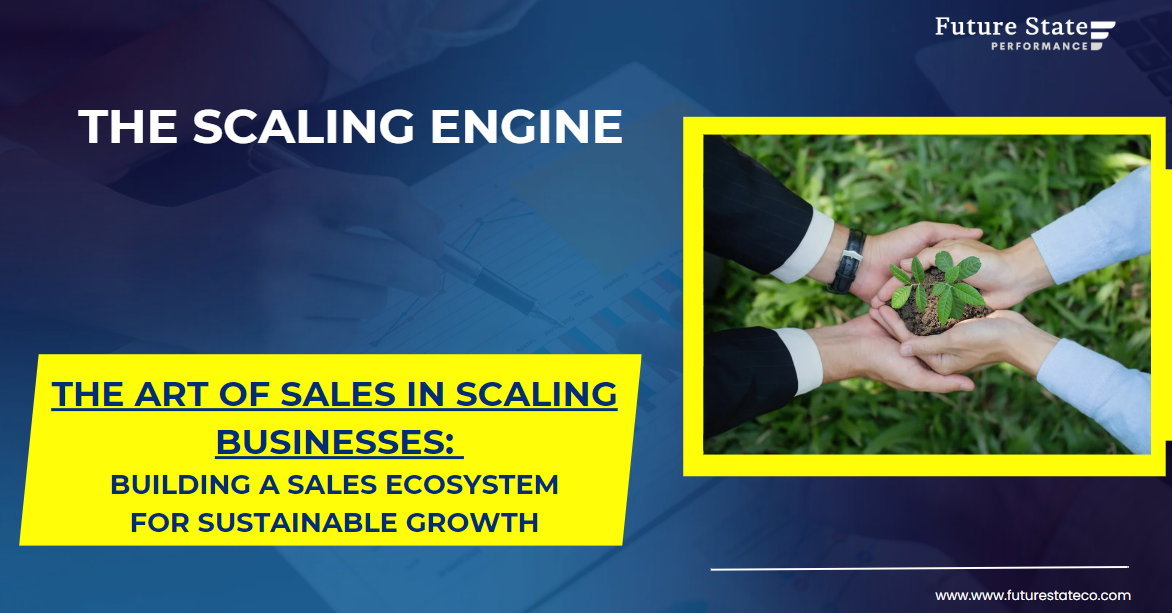Strategy
The Art of Sales in Scaling Businesses: Building a Sales Ecosystem for Sustainable Growth
By Shay Lynch
July 30, 2024
Key Highlights
In today's dynamic business landscape, redefining the sales approach is crucial for sustainable growth. This article explores the concept of building a sales ecosystem that transcends traditional transactional methods by focusing on creating value-based relationships.
It emphasises the importance of developing strategic partnerships to enhance offerings and expand market reach.
A key element of this ecosystem is delivering exceptional customer experiences that not only drive repeat sales but also encourage customers to become brand advocates, effectively opening up their networks and boosting referrals.
Integrating these efforts within an omnichannel strategy ensures that customer interactions are seamless and personalised across all platforms.
By focusing on these interconnected components, businesses can cultivate a self-sustaining sales ecosystem that nurtures long-term relationships and drives continuous growth
Key Takeaways
- Sales should be viewed as a strategic ecosystem integral to business growth.
- Aligning sales strategies with business objectives ensures more sustainable growth.
- Scalability and flexibility within the sales team are crucial for adapting to evolving market demands.
- Technology should be leveraged to optimise sales processes and to enhance BUT not replace customer relationships.
Introduction
In the competitive arena of modern business, understanding that sales is not merely about transactions but a comprehensive ecosystem is crucial. The essence of sales often gets misconstrued as merely closing deals.
The Philosophical Shift in Sales
However, the true goal of sales is far more relational than transactional. It’s not just about selling; it’s about creating and nurturing relationships. A robust sales ecosystem is fundamental in supporting a business’s scaling strategy, where the consequence of building the right relationships is, indeed, sales.
And this shift in perspective transforms sales from a departmental function to a core business strategy, essential for sustainable growth.
I always emphasise that the true goal of sales is not merely to sell, but to build lasting relationships. A sales ecosystem that prioritises relationship building over immediate sales nurtures long-term customer loyalty, which is essential for sustained business success.
The Sales Ecosystem
Building a robust ecosystem of sales involves crafting a value-based funnel that ensures every customer interaction is geared towards creating value and nurturing trust.
This starts with developing strategic partnerships that enhance product offerings and extend market reach. By delivering a consistently strong customer experience, businesses not only encourage repeat sales but also empower customers to become brand advocates.
Such satisfied customers often open up their networks, contributing to a potent referral system that brings in new leads organically. Central to this ecosystem is a focused omnichannel approach, which integrates various sales and marketing channels to deliver a seamless and personalised customer journey.
This interconnected system not only supports the immediate sales objectives but also nurtures long-term relationships and loyalty, creating a self-sustaining cycle of engagement and growth.
By concentrating on these elements, businesses can effectively expand their influence and ensure sustainability in a competitive market landscape
Aligning Sales with Business Strategy
A sales model should be intricately designed to support and amplify the overarching business strategy. This alignment ensures that every sales effort and initiative is not only aimed at generating immediate revenue but is also contributing to the broader business objectives. This strategic alignment is particularly critical in areas we previously discussed under the Profit Model, such as:
- Revenue Optimisation & Pricing: Developing pricing strategies that maximize profitability while still appealing to customers.
- Customer Experience & Relationship Management: Creating memorable customer experiences that foster loyalty and encourage repeat business.
- Process Optimisation – Standardisation: Streamlining and standardizing processes to reduce errors and increase efficiency, making the sales process less ad hoc and more precision-driven.
Dynamics of a Scalable Sales Model
The ad hoc nature of many sales processes often leads to inefficiencies and missed opportunities and in fact it has been labelled the most ad hoc area of business, when it should be the most precise. Key Considerations for a scaling model include:
- Flexible Team Structure: Implementing a team structure that can easily adapt to changing business needs without losing focus on core sales functions.
- Scalability: Ensuring that sales strategies and processes can grow in proportion to business needs without compromising on quality or customer satisfaction.
- Performance Management: Regularly assessing the performance of sales initiatives against business goals to ensure they are contributing positively to the overarching strategy.
- Training & Development: Continuously equipping the sales team with the latest skills and knowledge to handle emerging market challenges effectively.
Leveraging Technology in Sales
Technology plays a pivotal role in supporting and enhancing the sales ecosystem. Effective use of CRM systems, automation tools, and data analytics helps in:
- Streamlining operations: Automating routine tasks to focus more on strategy and customer engagement.
- Enhancing customer understanding: Using analytics to gain insights into customer behaviours and preferences, which can guide more personalized sales approaches.
However, don’t replace all customer relationship activities with software, a failing of modern sales models. CRM should be an 80% client facing process, not 80% behind a desktop screen.
Expanding the Market Through Strategic Sales
Building the ecosystem of sales involves not only nurturing existing relationships but also expanding to new markets and customer segments:
- Understanding Your Audience: Comprehensive market research to understand and anticipate the needs and expectations of new customer demographics.
- Omnichannel Strategy: Recognising that customers interact with brands across multiple channels and ensuring that the sales strategy is consistent across all these channels.
- Building Goodwill: Focusing on actions that build brand reputation and customer trust, which are critical for long-term relationships.
- Marketing Alignment: Ensuring that marketing and sales strategies are cohesively planned and executed to maximize market reach and impact.
Conclusion
The goal of a refined sales strategy is not just to enhance sales figures but to build and nurture relationships that lead to sustainable business growth. By creating a sales ecosystem that is aligned with the business strategy and enhanced by technology, businesses can achieve not only immediate gains but also long-term success. The consequence of carefully building relationships with the right audience is not merely a sale—it’s the establishment of a loyal customer base that will drive the future success of the business.
This comprehensive approach to building a sales strategy ensures that businesses are not only prepared to meet current market demands but are also poised for future expansion and success.
______________________________
⏩What are your thoughts? 💬 – How are you building your Sales Ecosystem?🌟💼
🔔 Hit the notification icon to get notified on new content
🔁 If this resonates, feel free to repost
______________________________
#futurestateacademy #systemsthinking #SalesStrategy #BusinessScaling #CustomerRelationships #RevenueGrowth #MarketExpansion #BusinessDevelopment #SalesEcosystem #ScalingSuccess #Entrepreneurship #InnovativeSale



